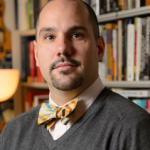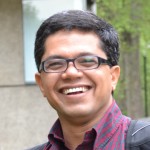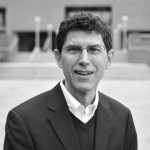On this page you can find out about the present projects being funded by H&C for University of Connecticut faculty. To view past faculty fellows you can use the menu on the right.
White identity, organizational homogeneity, and interpretations of racial stratification and redistributive polices for African Americans and Latinos
 Matthew D. Hughey (Sociology)
Matthew D. Hughey (Sociology)
My research seeks to better understand the relationship between white organizational homogeneity, white racial identity formation, and public discourse and beliefs about racial stratification toward African Americans and Latinos. Extant research has illumined the determinants of racial stratification and interpretations of redistributive policies among whites, yet this literature is due for an update given (1) the almost exclusive focus on racial attitudes (rather than identity formation) and (2) the use of quantitative, longitudinal analysis (rather than comparative and qualitative methodology inclusive of participant observation and ethnography), and (3) the aggregation of atomized social actors (rather than examinations of the specific lived experiences of civic engagement and public discourse via organizational activity).
Hence, paralleling some of the innovations found in my work, White Bound: Nationalists, Antiracists, and the Shared Meanings of Race (Stanford UP, 2012), I will expand and deepen the collection of data on how all-white organizational settings engender the formation and pursuit of a similar and “ideal” white racial identity that is intimately crocheted with discriminatory and racially-essentialist understandings and public discussion of racial stratification, African Americans, Latinos, and redistributive policies. Specifically, I will pool and compare my already collected ethnographic data (inclusive of in-depth interviews, participant observation, and content analysis) from the following all-white groups:
(1) a white nationalist organization (n=24, undertaken in 2006-07, mid-Atlantic US)
(2) a white antiracist organization (n=21, 2006-07, mid-Atlantic)
(3) a young professionals group (n=35, 2010-2012, deep South), and
(4) a college alumni group (n=41, 2010-2012, deep South).
I will compare and contrast that data with in-progress ethnographic studies of two all-white, Connecticut area organizations:
(5) a patriotic lineage society (n=30-50, 2015-present, New England), and
(6) a fraternal order (n=30-50, 2015-present, New England).
Debating climate change: public opinion, institutions, and discourses
 Prakash Kashwan (Political Science)
Prakash Kashwan (Political Science)
Face to face deliberations empower citizens by bolstering their confidence in their deliberative capacities and a context-specific measure of internal political efficacy. As significant, engagement in deliberative processes often produces new discourses, which are associated with less skepticism and a greater willingness to act, as individuals reconcile their position within the discourses – all of this indicative of a potentially enhanced public adaptive capacity. Juxtaposing the findings of empirical research on public opinion and citizen engagement to the contentious nature of climate change debates in the United States points to an important paradox. A sizeable section of citizens may hold views independent of the elite-dominated ideologically polarized debates one witnesses in the public sphere. Taking these possibilities as an important point of departure, this research argues for increased attention to the potential benefits of grassroots citizen engagement as a means of creating greater space for promoting pluralist and constructive public debates over climate change.
These normative goals inform the core agenda of this research proposal, which on the one hand analyzes the institutional arrangements that create spaces for public debates among actors with competing perspectives. On the other hand, and in so doing, this proposal fosters open-minded deliberations toward shared goals of security and prosperity and promotes much needed collective action for bolstering societal responses to climate change. Such a fusion is necessary because scholars show that shared understandings of issues of public importance are a product of the relationships among “discourse, institutions, and actions.” This research proposal introduces two analytical innovations. First, it takes seriously the possibility that citizens may harbor views independent of elite-dominated public discourses, which creates the potential for adding new layers of discourses to the already existing constellation of discourses. Second, this research uses citizen engagements via Town Conservation Commissions (TCCs) as an experiential source of autonomous ideas and discourses about climate change.
Beyond schism: searching for a unified theory of human trafficking/modern slavery
 Samuel Martinez (Anthropology & El Instituto)
Samuel Martinez (Anthropology & El Instituto)
In his PDP Fellowship semester (Spring 2017), Martínez will prepare a call for papers, conference funding proposal(s) and a theme paper for an expert workshop and multidisciplinary contributory volume to follow, examining the reasons why schism splits today’s discourse on trafficking, and calling for new theorizations of human trafficking and modern slavery which seek to reconcile divergent perspectives.
The public discourse on human trafficking and modern slavery was born in schism in late-1990s debates leading up to passage of UN and U.S. anti-trafficking laws, during which sex worker-rights feminists were accused of advancing a decriminalization agenda at the expense of women held in bondage, and anti-prostitution feminists were charged with extrapolating a global crisis of sex trafficking out of the nightmare personal accounts of a few women. Showdowns between law enforcement-based and rights liberal approaches have since spread across the larger trafficking discursive field. Driven by the tendencies of authors on both sides to stake out positions, blast opposing views as “myths,” and place exaggerated confidence in their own experientially-based ability to know unfree labor’s complex contours, the discourse on trafficking is virtually the opposite of “intellectual humility.”
By contrast, an open position on trafficking will be the starting premise for the dialogues to be facilitated through this project. Adopting an open position begins with accepting the accuracy of the reporting of both anti-trafficking abolitionists and rights liberals even as the divergent generalizations that each have extrapolated may be questioned. The project aim, of facilitating various approaches to understanding and superseding schism, carries the meta-message that no one disciplinary, activist or philosophical approach can claim to be the correct way to understand unfree labor after slavery. The workshop and contributory volume will be home to historical, sociological, philosophical, literary critical, critical legal and gender and ethnic studies perspectives. Undergirding the whole project is the ethico-political value of deferring position-taking and listening to all accounts, with the aim of seeking unifying theorizations and formulating political programs that can take consideration of seemingly contradictory information.
Student protests against racial microagressions and for inclusion on campuses
 Daisy Verduco Reyes (Sociology & El Instituto)
Daisy Verduco Reyes (Sociology & El Instituto)
During the Fall semester of 2015 students from elite small colleges to large public universities mobilized for racial justice and inclusion on campuses across the country. While a lot has been written about these student protests, there has been no systematic consideration of how particular institutional factors shaped this mobilization. I seek to understand students’ grievances and contextualize students' dialogue surrounding these grievances.
In my previous research on Latino student organizing, I identify campus organizational characteristics that situate and explain students’ grievances and the tactics they employ. It turns out the demographic profile of the student body (ethnic and socio-economic composition, as well as proportion of first-generation college students), residential arrangements, the relationship between students and administrators, and how well diversity programs integrate students through cultural centers and retention centers all influence how and why students protest. The proposed project will build on this research by investigating how these institutional dynamics have also shaped the context in which recent student activists have claimed space to speak out against racial injustice and for their inclusion on campuses across the country.
I am creating a database of the 2015-16 student protest locations (thedemands.org). The database includes an inventory of institutional characteristics of the campuses where students protested, events that transpired, the grievances, the tactics employed, and institutional responses. I will also be analyzing newspaper coverage in national, local, and university outlets to gather information about these protests. This project will broaden our understanding of how and why student protests by showing how campus characteristics create or limit spaces for distinctive kinds of deliberation and discourse. In a world where institutions dominate, we need to shed light on how institutional characteristics create spaces that operate as either barriers or facilitators for discourse.